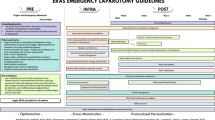Abstract
Objective
The objective of enhanced recovery after surgery (ERAS) programs is to incorporate strategies into the perioperative care plan to decrease complications, hasten recovery, and shorten hospital stay. This study was designed to determine which ERAS strategies contribute to overall shortened length of hospital stay in patients undergoing elective colorectal surgery in hospitals.
Methods
A retrospective cohort study of 336 consecutive patients at seven hospitals was performed. Demographic and data on 18 ERAS components identified from a systematic review of the literature were collected. A multiregression analysis was performed to assess for factors independently associated with a total length of hospital stay of 5 days or less.
Results
Fifty-five percent were male (mean age, 62 years), 57.5% had an ASA III or IV, 76.9% had cancer, and 28.6% had low rectal procedures; 46.3% were completed laparoscopically. The median length of stay was 6.5 days with a mean of 8.6 days. On bivariate analysis, strategies associated with a stay ≤5 days were preoperative counseling, avoidance of oral bowel preparation, use of a laparoscopic approach, use of a transverse incision, introduction of clear fluids on day of surgery, and early discontinuation of the Foley catheter (all P < 0.05). On multivariate analysis, factors that remained significantly associated with a stay ≤5 days included use of a laparoscopic approach (odds ratio (OR), 1.24; 95% confidence interval (CI), 1.12–1.38), preoperative counseling (OR, 1.26; 95% CI, 1.15–1.38), intraoperative fluid restriction (OR, 1.26; 95% CI, 1.15–1.37), clear fluids on day of surgery (OR, 1.09; 95% CI, 1.00–1.2), and Foley urinal catheter discontinued within 24 h of colon surgery and 72 h of rectal surgery (OR, 1.13; 95% CI, 1.01–1.27).
Conclusions
In hospitals with variable uptake of ERAS strategies, preoperative counseling, intraoperative fluid restriction, use of a laparoscopic approach, immediate initiation of clear fluids after surgery, and early discontinuation of the Foley catheter are all independently associated with shortened length of stay.
Similar content being viewed by others
References
Kehlet H, Wilmore DW (2008) Evidence-based surgical care and the evolution of fast-track surgery. Ann Surg 248:189–198
Adamina M, Kehlet H, Tomlinson GA, Senagore AJ, Delaney CP (2011) Enhanced recovery pathways optimize health outcomes and resource utilization: a meta-analysis of randomized controlled trials in colorectal surgery. Surgery 149:830–840
Anderson AD, McNaught CE, Macfie J, Tring I, Barker P, Mitchell CJ (2003) Randomized clinical trial of multimodal optimization and standard perioperative surgical care. Br J Surg 90:1497–1504
Gatt M, Anderson AD, Reddy BS, Hayward-Sampson P, Tring IC, Macfie J (2005) Randomized clinical trial of multimodal optimization of surgical care in patients undergoing major colonic resection. Br J Surg 92:1354–1362
Khoo CK, Vickery CJ, Forsyth N, Vinall NS, Eyre-Brook IA (2007) A prospective randomized controlled trial of multimodal perioperative management protocol in patients undergoing elective colorectal resection for cancer. Ann Surg 245:867–872
Muller S, Zalunardo MP, Hubner M, Clavien PA, Demartines N (2009) A fast-track program reduces complications and length of hospital stay after open colonic surgery. Gastroenterology 136:842–847
Serclova Z, Dytrych P, Marvan J, Nova K, Hankeova Z, Ryska O, Slegrova Z, Buresova L, Travnikova L, Antos F (2009) Fast-track in open intestinal surgery: prospective randomized study (Clinical Trials Gov Identifier no. NCT00123456). Clin Nutr 28:618–624
Fearon KC, Ljungqvist O, Von MM, Revhaug A, Dejong CH, Lassen K, Nygren J, Hausel J, Soop M, Andersen J, Kehlet H (2005) Enhanced recovery after surgery: a consensus review of clinical care for patients undergoing colonic resection. Clin Nutr 24:466–477
Lassen K, Soop M, Nygren J, Cox PB, Hendry PO, Spies C, von Meyenfeldt MF, Fearon KC, Revhaug A, Norderval S, Ljungqvist O, Lobo DN, Dejong CH (2009) Consensus review of optimal perioperative care in colorectal surgery: Enhanced Recovery After Surgery (ERAS) Group recommendations. Arch Surg 144:961–969
Eskicioglu C, Forbes SS, Aarts MA, Okrainec A, McLeod RS (2009) Enhanced recovery after surgery (ERAS) programs for patients having colorectal surgery: a meta-analysis of randomized trials. J Gastrointest Surg 13:2321–2329
Hubbard AE, Ahern J, Fleischer NL, Van der Laan M, Lippman SA, Jewell N, Bruckner T, Satariano WA (2010) To GEE or not to GEE: comparing population average and mixed models for estimating the associations between neighborhood risk factors and health. Epidemiology 21:467–474
Maessen J, Dejong CH, Hausel J, Nygren J, Lassen K, Andersen J, Kessels AG, Revhaug A, Kehlet H, Ljungqvist O, Fearon KC, von Meyenfeldt MF (2007) A protocol is not enough to implement an enhanced recovery programme for colorectal resection. Br J Surg 94:224–231
Khan S, Gatt M, Macfie J (2009) Enhanced recovery programmes and colorectal surgery: does the laparoscope confer additional advantages? Colorectal Dis 11:902–908
Chan MK, Law WL (2007) Use of chewing gum in reducing postoperative ileus after elective colorectal resection: a systematic review. Dis Colon Rectum 50:2149–2157
McCarthy GC, Megalla SA, Habib AS (2010) Impact of intravenous lidocaine infusion on postoperative analgesia and recovery from surgery: a systematic review of randomized controlled trials. Drugs 70:1149–1163
Parnaby CN, MacDonald AJ, Jenkins JT (2009) Sham feed or sham? A meta-analysis of randomized clinical trials assessing the effect of gum chewing on gut function after elective colorectal surgery. Int J Colorectal Dis 24:585–592
Delaney CP, Zutshi M, Senagore AJ, Remzi FH, Hammel J, Fazio VW (2003) Prospective, randomized, controlled trial between a pathway of controlled rehabilitation with early ambulation and diet and traditional postoperative care after laparotomy and intestinal resection. Dis Colon Rectum 46:851–859
Acknowledgement
Supported by a grant from Colon Cancer, Canada.
Disclosures
Drs. Aarts, Okrainec, and McLeod, along with authors Emily Pearsall, Amy Glicksman, and J. Charles Victor, have no conflicts of interest or financial ties to disclose.
Author information
Authors and Affiliations
Corresponding author
Rights and permissions
About this article
Cite this article
Aarts, MA., Okrainec, A., Glicksman, A. et al. Adoption of enhanced recovery after surgery (ERAS) strategies for colorectal surgery at academic teaching hospitals and impact on total length of hospital stay. Surg Endosc 26, 442–450 (2012). https://doi.org/10.1007/s00464-011-1897-5
Received:
Accepted:
Published:
Issue Date:
DOI: https://doi.org/10.1007/s00464-011-1897-5




